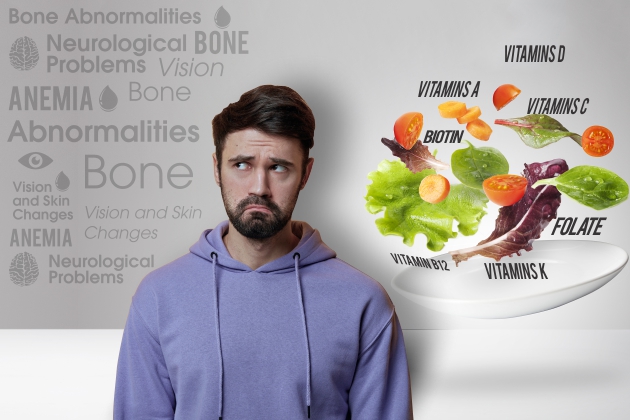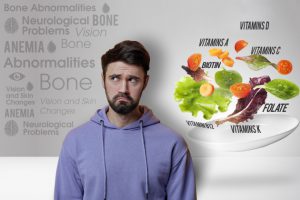
Vitamin Deficiency Causes
Are many and are not limited to your diet alone. Your body needs 13 essential vitamins in tiny amounts. Each of these vitamins has a different role to play in the functioning of the body. If you don’t get enough of these vitamins, it can lead to a vitamin deficiency, causing several health conditions depending on which vitamin is lacking.
A Complete Vitamin Profile is usually done to detect vitamin deficiency. Once diagnosed, the deficiency is treated by replenishing the lacking vitamins either through food, supplements, or both. In severe deficiency cases, intravenous infusions may be administered.
The 13 Essential Vitamins are:
- Vitamin A
- Vitamin C
- Vitamin D
- Vitamin K
- Vitamin E
- Vitamin B12 cobalamin
- Vitamin B9 folate
- Vitamin B5 pantothenic acid
- Vitamin B3 niacin
- Vitamin B2 riboflavin
- Vitamin B7 biotin
- Vitamin B1 thiamine
- Vitamin B6 pyridoxine
Common Vitamin Deficiencies and How They Affect Your Health
Each vitamin has a different role to keep your body functioning properly. Some vitamins keep your nerves healthy, some help prevents infections, some help your blood clot, while others help your body get energy from food. Listed below are common vitamin deficiencies and their effect on health.
Vitamin Deficiency |
Effect on Health |
| Vitamin A | Vision and skin changes |
| Vitamin D | Bone abnormalities |
| Vitamin K | Blood clotting issues |
| Iron | Anemia |
| Vitamin B12 | Anemia |
| Vitamin E | Neurological problems |
Common Signs of Vitamin Deficiency
- Fatigue
- Brittle nails and hair
- Bleeding gums
- Poor healing of wounds
- Restless leg syndrome
- Hair loss
- Dandruff and scaly patches
- Change in skin color
An Insight Into the Causes of Vitamin Deficiency
One of the most obvious Vitamin deficiency causes is your diet. A balanced diet provides you with enough vitamins to keep you healthy. However, certain factors can cause vitamin deficiencies, including:
1. Certain Diets
Above all, some diets make you vulnerable to vitamin deficiency. For example, if your diet is:
- Dairy-free-You can become vitamin D deficient
- Vegan or vegetarian- You increase your risk of B12 and biotin deficiency.
- Gluten-free-You can become deficient in many vitamins, including thiamine and folate.
- Low in fresh fruits and vegetables and high in processed foods- You can become vitamin K and vitamin E deficient.
2. Underlying Medical Condition
Some medical problems make it difficult for the body to absorb and metabolize vitamins, leading to vitamin deficiency. They include:
- Liver failure
- Alcoholic liver disease
- Kidney disease
- Malabsorption syndrome
- Chronic diarrhea
- Gastric bypass
- Irritable bowel syndrome
- Crohn’s disease
- Inflammatory bowel diseases
3. Sunlight
Although vitamin D is found in foods such as eggs, seafood, and dairy products, sunlight is also an important source. Non-exposure to sunlight or lack of it can cause Vitamin D deficiency.
4. Pernicious anemia
This is an autoimmune disease that affects the small intestine. This decreases the absorption of vitamin B12, leading to anemia.
It is important to identify the vitamin deficiency causes to treat it efficiently. If the vitamin levels are not replenished, the condition gradually worsens, causing different symptoms that can affect the quality of your life.
